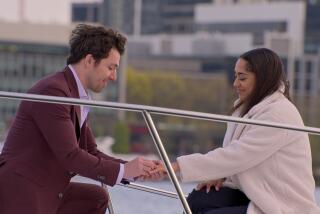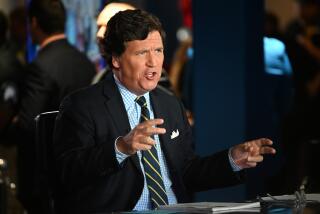ADS ON BBC?--CHALLENGE TO NETWORK AUTONOMY : Second of two parts
- Share via
SHERBORNE, England — “I would die if a single commercial were introduced on the BBC,” die-hard Gavin Millar declared.
“It would ruin us,” Alan Shallcross said. “No question about it. Advertising would be absolutely fatal. I believe that, truly and passionately.”
Added Brian Phelan: “It would be an absolute disgrace.”
The concern of director Millar, producer Shallcross and writer Phelan may be justified. The government recently ordered a 15-month inquiry into alternative means of financing the publicly supported British Broadcasting Corp.
Public opinion polls show a majority of Britishers favoring the introduction of advertising on the BBC, a quasi-official entity operating under a royal charter.
In contrast to Britain’s ad-supported Independent Television (ITV), the pounds-poor, awesomely large, bureaucratic and prestigious BBC is now supported solely by a license fee on TV households.
And wanting to keep the present method of funding are Shallcross, Millar and Phelan.
They are spending three weeks on a 178-acre farm outside this picturesque Dorset village, making a grim 90-minute BBC drama called “The Russian Soldier.”
Phelan’s story concerns a farm family contaminated by an accident stemming from germ warfare experiments conducted by the government. One evening, the farm owner mistakes a tree for a Russian soldier. That’s a bit of symbolism, for the real enemy in this story comes from within, not from the Soviet Union.
The drama ends with the infected family being hauled off in steel containers, their contaminated land quarantined for a century.
“The Russian Soldier” is a story without hope. No false optimism for Phelan. No advertisers to please.
It is the kind of potent-but-downbeat drama that is possible on the ad-less BBC. No matter its dramatic merits, it likely would not be produced for ad-supported U.S. television where virtually every drama--regardless of topic--must end with at least a glint of hope in order to be commercially salable.
And it is the kind of story that Shallcross, Millar and Phelan--all with blue-chip reputations--fear would be rejected by a BBC beholden to sponsors.
Possibly, so would have been “Threads,” last year’s BBC-depicted nuclear destruction of Sheffield (aired recently by Atlanta cable station WTBS after its rejection by other U.S. TV outlets), which ended more bleakly even than ABC’s “The Day After.”
The BBC is not beyond criticism. After seven well-known journalists were sacked by the BCC on Tuesday, reportedly for budgetary reasons, their colleagues called a 24-hour strike that caused the blacking out of several public affairs programs. The BBC is, by many accounts, arrogant, unwieldy and in limbo between seeking mass quality and mass audiences.
But at least it often encourages experimentation and a truthfulness far less likely to be found in TV shaped almost solely by commercial ambitions.
“There’s no hope at the end of ‘The Russian Soldier’ because there’s no hope when something like this actually goes wrong,” said Shallcross, a BBC staff producer and farmer’s son who spent three years in the U.S. in the late ‘60s.
The BBC doesn’t set out to make gloomy TV. “But this sort of story is not unusual for us,” Shallcross said. “The BBC will do 70 to 80 plays (TV dramas) this year and the range of subjects and approach is incredible--you have tremendous freedom.”
That was echoed by Phelan, who has no BBC contractual ties. “I can propose to a producer like Alan an idea,” said Phelan, who lives with his wife on the farm where his story is being staged for TV. “I can write it and have it made in a way that reflects the society I live in, and without artificial pressures. That is what the BBC gives you. That is freedom.”
And that is one reason the BBC draws top talent willing to work for relatively low pay.
While watching “The Shooting Party,” a splendid British movie now playing in London, it occurs that at least two-thirds of the top cast members also have starred in BBC television, in addition to ITV (Independent Television) productions. That sort of crossover of top stars is rare in U.S. television.
“You pay a price to work for the BBC,” Phelan said. “You earn less money. When I tell my American writer friends the kind of money a writer makes at the BBC, they are astonished.
“I am 50 years old,” he continued. “I’m arguably very successful. And yet I’ve never been as much in debt in my life. I’ve been asked to write specials for independent American producers, but after a period of time, I decide I don’t want to do it.”
It’s the BBC’s free environment that is irresistible to Phelan and others. “But if they start taking commercials, then the whole atmosphere will alter,” he said.
However, there’s always the possibility of bending to other pressures as well.
The British government has a hands-off tradition when it comes to the BBC. Yet the potential for interference always exists in such a broadcast system, as evidenced by Prime Minister Margaret Thatcher’s ominous public criticism in 1982 of BBC Falkland War coverage that she felt was unpatriotic.
But that, Phelan says, is preferable to a broadcast system marching to the step of the Advertising Soldier.
More to Read
The complete guide to home viewing
Get Screen Gab for everything about the TV shows and streaming movies everyone’s talking about.
You may occasionally receive promotional content from the Los Angeles Times.






